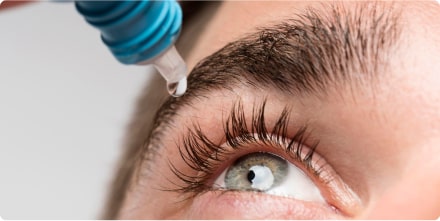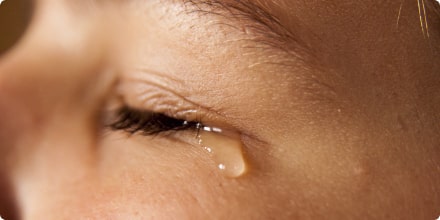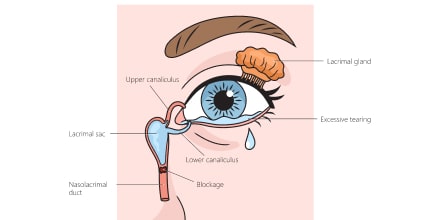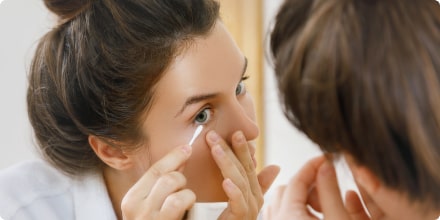Table of content
What is Dry Eye Syndrome?
Dry eye syndrome is a common condition characterised by insufficient tear production or poor tear quality, leading to discomfort and visual disturbances in our eyes. Early detection and management are essential to alleviate symptoms and prevent complications.
Symptoms
Individuals with dry eye syndrome may experience the following symptoms:

- Dryness or gritty feeling in the eyes
- Burning or stinging sensation
- Redness
- Blurred vision
- Sensitivity to light
- Eye fatigue or discomfort due to prolonged screen time or reading
Causes
Dry eye syndrome can result from various biological, environmental and lifestyle related factors. These factors cause a disruption in the tear production and quality, leading to discomfort and visual disturbances.
Types
Dry eye syndrome can be classified into two main types:
Aqueous tear-deficient dry eye
In this type, the lacrimal glands fail to produce enough watery tears to keep our eyes adequately lubricated.
Evaporative dry eye
This type occurs when tears evaporate too quickly due to poor lipid (oil) layer in the tears or dysfunction of the meibomian glands.
Risk Factors
Several factors increase the risk of developing dry eye syndrome, including:

- Ageing
- Menopause
- Dry climates
- Prolonged screen time
- Underlying medical conditions like autoimmune diseases or diabetes
- Medications that reduce tear production or quality
How to prevent
While dry eye syndrome may not always be preventable, individuals can take steps to reduce its severity and frequency or you can contact us the best eye hospital of Maharashtra
Use a humidifier to add moisture to indoor air
Take breaks during prolonged screen time to blink and rest the eyes
Wear sunglasses outdoors to protect the eyes from wind and sun exposure
Stay hydrated by drinking plenty of water
Avoid smoke and other irritants that can worsen dry eye symptoms
Types of Treatments
Treatment for dry eye syndrome aims to alleviate symptoms and improve tear production and quality. Common treatments may include:

Artificial tears or lubricating eye drops to provide temporary relief

Prescription medications like anti-inflammatory eye drops or medications that stimulate tear production

Punctal plugs to block tear drainage and keep tears on the eye surface longer

Warm compresses and eyelid hygiene to improve oil gland function

Lifestyle changes such as using a humidifier and avoiding dry or windy environments
Regular eye exams are essential for diagnosing and managing dry eye syndrome effectively.
Table of content
Book an appointment
Informative and Comprehensive
Frequently Asked Questions
Common queries about the treatment are addressed in this section. Find your answers here.
How do i schedule an appointment?
You can schedule an appointment by calling our hospital directly, filling out our online appointment request form or visit our hospital in person. Our staff will assist you in finding a convenient appointment time.
How long is the recovery period after eye surgery?
Recovery time can vary depends upon the types of surgery performed and individual factors. Generally, most patients experience significant improvement within few days or weeks following surgery.
Do you accept insurance plans?
Yes, we accept insurance plans and we aslo accept flexible payment options for patients without insurance coverage. you can visit our website for more details and can contact our billing department for specific insurance-related inquiries.
What are the common eye conditions treated at your hospital?
We specialise in treating a wide range of eye conditions, including cataract, glaucome, macular degeneration, diabetic retinopathy, and refractive errors such as myopia and hypermetropia and astigmatism.
What measures do you take to ensure patient safety during eye surgeries?
We follow strict surgical protocols and maintain a sterile environment in our surgical facilities to minimize the risk of infection and ensure the safety of our patients during eye surgery.
Do you offer pediatric eye care services?
Yes, we provide specialised pediatric eye care services, including comprehensive eye care examination, vision screenings, and treatment of common childhood eye conditions.